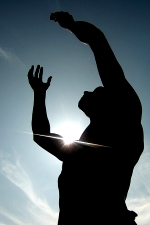by Christopher B. Warner
Far from being distant and “out of touch,” the words of the Fathers are quite down-to-earth and often humorous. St. Basil the Great, for example, wrote that sacred music must both appeal to the people and trick them into worshipping God:
For when the Holy Spirit saw that mankind was ill-inclined toward virtue and that we were heedless of the righteous life because of our inclination to pleasure, what did he do? He blended the delight of melody with doctrine in order that, through the pleasantness and softness of the sound, we might unawares receive what was useful in the words according to the practice of wise physicians who, when they give the more bitter drafts to the sick, often smear the rim of the cup with honey. For this purpose, these harmonious melodies of the psalms have been designed for us, that those who are of boyish age or wholly youthful in their character, while in appearance they sing, may in reality be educating their souls.
In other words, music must be joyful and beautiful so that people will learn their Faith and want to come and worship God in church. Conversely, St. John Maximovitch said,
“The psalms and the hymns that simply gratify the ear but do not inspire somebody to pray are not acceptable.”
 In fact, that is the main point, as St. Basil goes on to say that liturgical music must always be a work of prayer and worship because liturgy is an imitation of heavenly glory and praise…Let us, however, be clear that the Fathers were not friendly to popular music and secular culture. The guardians of early Christianity were very particular about both the content and style of sacred music because they lived in a secular culture hostile to Christian morals. Church music was primarily the product of Jewish synagogue worship which prayerfully developed with Christian usage into practices that were fitting for liturgical worship.
In fact, that is the main point, as St. Basil goes on to say that liturgical music must always be a work of prayer and worship because liturgy is an imitation of heavenly glory and praise…Let us, however, be clear that the Fathers were not friendly to popular music and secular culture. The guardians of early Christianity were very particular about both the content and style of sacred music because they lived in a secular culture hostile to Christian morals. Church music was primarily the product of Jewish synagogue worship which prayerfully developed with Christian usage into practices that were fitting for liturgical worship.
